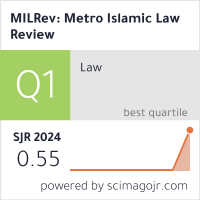Reinterpreting Justice in Al-Farabi’s Political Philosophy: Relevance to Contemporary Islamic Human Rights Thought
DOI:
https://doi.org/10.32332/milrev.v4i1.10466Keywords:
Al-Farabi, Human Rights, Islamic Civilization, Justice, Political Philosophy.Abstract
This study critically explores Al-Farabi’s conception of justice in his political philosophy and evaluates its normative potential and conceptual limitations in the context of contemporary human rights discourse. The central research question investigates the extent to which Al-Farabi’s vision of the al-Madina al-Fadila (Virtuous City) can serve as a philosophical framework for bridging classical Islamic values with modern human rights principles. Rather than assuming full compatibility, the study interrogates the tension between Al-Farabi’s virtue-based, hierarchical model of justice and contemporary demands for equality, intersectional rights, and democratic participation. Employing a qualitative, library-based method and a philosophical hermeneutic approach, the research analyzes key texts—particularly Ara’ Ahl al-Madina al-Fadila and Tahsil al-Sa‘ada—alongside contemporary literature on Islamic legal reform and human rights theory. The findings demonstrate that Al-Farabi’s emphasis on rational leadership, ethical governance, and communal well-being—while historically bounded—offers interpretive value for rethinking legal reform through maqasid al-shari‘ah and contextual ijtihad. However, the study also underscores the epistemological challenges of adapting metaphysical frameworks to rights-based paradigms. It concludes that Al-Farabi’s thought should inspire—not dictate—Islamic legal innovation by contributing ethical and rational principles that remain critically grounded within both Islamic tradition and contemporary socio-legal realities. Academically, this research contributes to the growing body of interdisciplinary scholarship at the intersection of Islamic philosophy, political theory, and human rights, offering a nuanced reappraisal of classical Islamic thought as a dynamic resource for ethical-legal reform in pluralistic modern societies.
Downloads
References
Abdul Salam. Al-Falsafah As-Siyasiyyah ’Inda Al_Farabi. Beirut: Darul at-Tali’ah, 1997.
Aina Noor Habibah. “KONSEP NEGARA IDEAL DALAM PEMIKIRAN AL-FARABI Telaah Kitab Ara’ Ahl Madinah Al-Fadilah.” Jurnal Ilmiah Spiritualis: Jurnal Pemikiran Islam Dan Tasawuf 5, no. 2 (2020): 134–52. https://doi.org/10.53429/spiritualis.v5i2.65.
Al-Farabi. As-Siyasah Al-Madaniyah. Damaskus: Darul al-Masyriq, 1994.
Alfarabi. Ara Ahl Al-Madinah Al-Fadhilah. Beirut: Dar al-Masyriq, 2003.
Amin Alamsyah, Anas. “Menyelaraskan Nilai-Nilai Lokal Dan Global: Perspektif Filsafat Tentang Pendidikan Islam Di Era Globalisasi.” PROGRESSA: Journal of Islamic Religious Instruction 7, no. 2 (2023): 189–200. https://doi.org/10.32616/pgr.v7.2.472.189-200.
Antika, Yumi, and Jagad Aditya Dewantara. “Keterkaitan Pemikiran Al-Farabi Mengenai Negara Yang Ideal Dengan Konsep Kehidupan Bernegara Di Indonesia.” Jurnal Kewarganegaraan 5, no. 2 (2021): 448–456. https://doi.org/10.31316/jk.v5i2.2292.
Aryati, Aziza. “Rekonsiliasi Antara Filsafat Dan Agama: Telaah Pemikiran Filsafat Al-Farabi.” Syi’ar 12, no. 2 (2018): 1–11.
Aziz, Muhammad, Maftuh Maftuh, Bayu Mujrimin, Moh. Agus Sifa’, and Sandro Wahyu Permadi. “Providing Incentive Guarantees and Privileges for Health Services in the Implementation of Legal Protection for Health Workers During the Covid-19 Pandemic.” De Jure: Jurnal Hukum Dan Syar’iah 14, no. 1 (June 29, 2022): 111–124. https://doi.org/10.18860/j-fsh.v14i1.15280.
Dewi Fransiska Mamonto, Selfrinda Rezkita Mahmud, Risnawati Utina, Geya Sukmawati, and Fahira Nadra Male. “Islamic Civil Law in Indonesia: Developments, Challenges, and Future Prospects.” NUSANTARA: Journal Of Law Studies 3, no. 02 (December 25, 2024): 50–58. https://juna.nusantarajournal.com/index.php/juna/article/view/103.
Emzaed, Ali Murtadho, Ibnu Elmi AS Pelu, and Shakhzod Tokhirov. “Islamic Law Legislation in Indonesia: Anomalies of the Relationship between Political Configuration and Zakat Legal Product during the Reform Era.” Al-Manahij: Jurnal Kajian Hukum Islam 17, no. 1 (May 29, 2023): 97–112. https://doi.org/10.24090/mnh.v17i1.7815.
Fathorrahman, A Hashfi Luthfi, Riyanta, and Ach Fatayillah Mursyidi. “Dynamics of Thought in the Fiqh of Civilization Halaqah at Pesantren Affiliated with Nahdlatul Ulama (NU) in Yogyakarta.” Ijtihad : Jurnal Wacana Hukum Islam Dan Kemanusiaan 24, no. 1 (July 23, 2024): 71–95. https://doi.org/10.18326/ijtihad.v24i1.71-95.
Fauzi Rahmat Pamula, and Sayehu. “Rights and Obligations of Husband and Wife (Theological Normative and Sociological Approach).” Jurnal Hukum Keluarga 1, no. 02 (February 12, 2024): 1–9. https://doi.org/10.63731/jhk.v1i02.13.
Ferstman, Carla, Alexander Goldberg, Tony Gray, Liz Ison, Richard Nathan, and Michael Newman. “Contemporary Human Rights Challenges: The Universal Declaration of Human Rights and Its Continuing Relevance.” Contemporary Human Rights Challenges: The Universal Declaration of Human Rights and Its Continuing Relevance, no. September 2018 (2018): 1–238. https://doi.org/10.4324/9781351107136.
Fidawaty, Linda. “Aborsi Dalam Perspektif Hak Asasi Manusia Dan Hukum Islam (Analisis Terhadap Peraturan Pemerintah No. 61 Tahun 2014 Tentang Kesehatan Reproduksi).” Al-’Adalah 14, no. 1 (2018): 107. https://doi.org/10.24042/adalah.v14i1.2930.
Gunawan, Emita. “Relevansi Konsep Negara Dalam Pemikiran Al-Farabi Di Masa Indonesia Sekarang.” Jurnal Pendidikan PKN (Pancasila Dan Kewarganegaraan) 2, no. 2 (2021): 88. https://doi.org/10.26418/jppkn.v2i2.47791.
Harahap, Haddad Ulum, Muhammad Fadhlan Is, Amrar Mahfuzh Faza, and Muhamad Hasan Sebyar. “Legal Status of a Wife Leaving Her Husband and Vice Versa in Contextual Fiqh Studies: A Pre-Divorce Analysis.” Jurnal Ilmiah Mizani: Wacana Hukum, Ekonomi Dan Keagamaan 12, no. 1 (April 16, 2025): 50. https://doi.org/10.29300/mzn.v12i1.7158.
Himatul ulya. “Peran Filsafat Hukum Dalam Pembentukan Hukum Di Indonesia.” MANDUB: Jurnal Politik, Sosial, Hukum Dan Humaniora 2, no. 2 (2024): 321–331.
Humaidi, Humaidi. “Hubungan Harmonis Antara Sains Dan Agama Dalam Pemikiran Al-Farabi Dan Ikhwan Al-Shafa.” Kordinat: Jurnal Komunikasi Antar Perguruan Tinggi Agama Islam 17, no. 1 (2018): 142–166. https://doi.org/10.15408/kordinat.v17i1.8106.
Idrus, Achmad Musyahid, Roswati Nurdin, Rahman Qayyum, Patimah Halim, and Rahmah Amir. “The Tradition of Mappasikarawa in the Bugis-Makassar Community Marriage: A Study of Islamic Law Philosophy.” Samarah: Jurnal Hukum Keluarga Dan Hukum Islam 7, no. 2 (May 9, 2023): 848. https://doi.org/10.22373/sjhk.v7i2.17125.
Jafar, Wahyu Abdul, Zulfikri Zulfikri, Amin Sadiqin, Usman Jayadi, and Irma Suriyani. “The Childfree Phenomenon Based on Islamic Law and Its Respond on Muslim Society.” Al-Istinbath: Jurnal Hukum Islam 8, no. 2 (November 9, 2023): 389. https://doi.org/10.29240/jhi.v8i2.7865.
Khadduri, Majid. Mafhum Al-Adl Fii Al-Islam. Damaskus: Dar al-Hasan, 1998.
Kurmangaliyeva, Galiya, and Aslan Azerbayev. “Al-Farabi’s Virtuous City and Its Contemporary Significance (Social State in Al-Farabi’s Philosophy).” The Anthropologist 26, no. 1–2 (October 17, 2016): 88–96. https://doi.org/10.1080/09720073.2016.11892133.
Kurniawan, Puji. “Masyarakat Dan Negara Menurut Al-Farabi.” Jurnal El-Qanuniy: Jurnal Ilmu-Ilmu Kesyariahan Dan Pranata Sosial 4, no. 1 (2018): 101–115. https://doi.org/10.24952/el-qonuniy.v4i1.1830.
M. Ali Rusdi, Syafa’at Anugrah Pradana, Rustam Magun Pikahulan, Faisal Nur Shadiq Shabri, and Dirga Achmad. “The King’s Decree: Integration of Customary Law and Islamic Law in the Clove Lease Agreement.” Ijtihad : Jurnal Wacana Hukum Islam Dan Kemanusiaan 24, no. 1 (July 23, 2024): 97–118. https://doi.org/10.18326/ijtihad.v24i1.97-118.
Mahatma, Masmuni. “Islamic Preaching and Its Significance in Realizing the Virtuous City (Al-Madinah Al-Fadhilah) in the Perspective of Al-Farabi.” Ilmu Dakwah: Academic Journal for Homiletic Studies 17, no. 1 (2023): 203–222. https://doi.org/10.15575/idajhs.v17i1.26150.
Mahdi, Muhammad. Asas Al-Falasifah as-Siyyasiyah Fill Al-Islam. Paris: Flammarion, 2000.
Muttaqin, Jamalul. “AL-FARABI : Politik Sebagai Jalan Kebahagiaan.” An-Nur : Jurnal Studi Islam 14, no. 2 (2022): 129–144.
Nassif Nassar. Logika Otoritas: Pengantar Filsafat Materi. 2nd ed. Beirut: Amwaj Publishing House, 2001.
Nurhuda, Abid. “Kepemimpinan Negara Dalam Diskursus Pemikiran Politik Al-Farabi : Book Review.” Tolis Ilmiah: Jurnal Penelitian 5, no. 1 (2023): 71. https://doi.org/10.56630/jti.v5i1.338.
Pancawati, Hesti. “Pemikiran Al-Farabi Tentang Politik Dan Negara.” Aqlania 9, no. 1 (2018): 73. https://doi.org/10.32678/aqlania.v9i01.2063.
Purnomo, Agus, Nor Salam, Mukhammad Zamzami, and Abu Bakar. “Dimensions of Maqasid Al-Shari‘Ah and Human Rights in the Constitutional Court’s Decision on Marriage Age Difference in Indonesia.” Samarah: Jurnal Hukum Keluarga Dan Hukum Islam 7, no. 3 (July 30, 2023): 1397. https://doi.org/10.22373/sjhk.v7i3.13283.
Reja, R, M Hasan, and N Hakimah. “Analisis Yuridis Terhadap Isbat Nikah Yang Akad Nikahnya Oleh Wali Hakim (Studi Penetapan Pengadilan Agama Nanga Pinoh,” Al-Usroh, 2022. http://e-journal.iainptk.ac.id/index.php/alusroh/article/view/706.
Rohmah, Siti, Moh Anas Kholish, and Andi Muhammad Galib. “Human Rights and Islamic Law Discourse: The Epistemological Construction of Abul A’la Al-Maududi, Abdullahi Ahmed An-Naim, and Mashood A. Baderin.” Justicia Islamica 19, no. 1 (July 1, 2022): 153–170. https://doi.org/10.21154/justicia.v19i1.3282.
Sabri, Fahruddin Ali, Imron Rosyadi, Mohammad Isfironi, Mukhammad Nur Hadi, M Sulthon, and A. Mufti Khazin. “Navigating Stigma and Discrimination: Betrothal Challenges Faced by Descendants of Leprosy in Madura, Indonesia.” Al-Istinbath: Jurnal Hukum Islam 8, no. 2 November (November 9, 2023): 553. https://doi.org/10.29240/jhi.v8i2.6905.
Sebyar, Muhamad Hasan. “Harmonization of Islamic Legal Institutions and Customary Law in Marriage Dispensation Cases at The Panyabungan Religious Court.” MILRev : Metro Islamic Law Review 2, no. 2 (2023): 155. https://doi.org/10.32332/milrev.v2i2.7809.
Sonafist, Y, and Henny Yuningsih. “Islamic Law, the State, and Human Rights: The Contestation of Interfaith Marriage Discourse on Social Media in Indonesia.” JURIS (Jurnal Ilmiah Syariah) 22, no. 2 (December 28, 2023): 381. https://doi.org/10.31958/juris.v22i2.10934.
Sriani, Endang, Farid Hasan, and Sukron Ma’mun. “Violation of Human Right for Collateral Fraud in Sharia Financial Institution Based on Fiduciary Guaranty Law and Rahn Law.” JURIS (Jurnal Ilmiah Syariah) 22, no. 1 (June 15, 2023): 133. https://doi.org/10.31958/juris.v22i1.9157.
Tanabayeva, Anar, Aliya Massalimova, Orazgul Mukhatova, Marzhan Alikbayeva, and Zhuldyz Alikbayeva. “Al-Farabi’s Humanistic Principles and ‘Virtuous City,’” 2015, 124–129. https://doi.org/10.15405/epsbs.2015.01.14.
Zakiyah Daradjat. Ilmu Pendidikan Islam. Jakarta: Bina Aksara, 2527.
Downloads
Published
Issue
Section
License
Copyright (c) 2025 Syukri, Adenan, Syahminan

This work is licensed under a Creative Commons Attribution-ShareAlike 4.0 International License.










